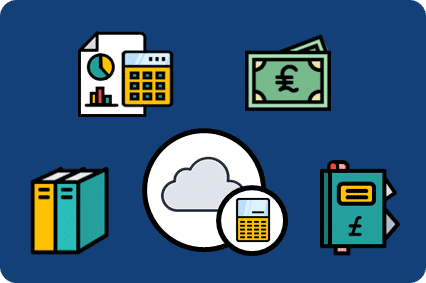Understanding The Benefits Of Cloud Accounting And What It Means For Business And Accounting
Updated 26th May 2021 | 4 min read Published 27th March 2018

Modern businesses operate in an environment that is continually evolving, and they have to adapt to the increasingly digitised landscape in order, not just to thrive, but to stay relevant. Companies that fail to keep up with this new fast-paced environment risk falling away in anonymity alongside their archaic processes.
Cloud-based accounting and financial technology is one of the fastest growing industries, and a study released by Raconteur showed that 40% of the participants believed that cloud computing and storage will be the technology that has the greatest impact on businesses in the next five years.
The business benefits of cloud accounting and other financial technologies far outweigh the initial investment costs; it provides companies with a clear portfolio overview with highly secure accounting services that are accessible from anywhere in the world. The centralised data management system allows for total visibility, and cost saving, through tools that identify opportunities for optimisation and for making strategic business decisions.
The Benefits Of Cloud Accounting
The problem with traditional accounting is that there are huge inconsistencies in storage that are open to and prone to human errors, and their processes are too convoluted to provide the right amount of real-time data and analytics that are needed to thrive in today’s modern business environment.
Cloud accounting addresses most of the issues that traditional processes are faced with. In doing so, it provides an accounting platform that doesn’t just store information successfully, but that can generate the data needed for companies to make smarter business decisions, identify untapped opportunities, and save money through improved efficiency and optimisation.
- Instant overview: One of the biggest challenges for businesses in accounting and storage management, is having one unified repository on which to access all their data. Traditional accounting and storage management often results in little bits of essential information getting stored in different places, and thus getting an accurate overview of an entire portfolio is often impossible. Cloud accounting allows total visibility through a powerful dashboard that can generate instant insights and satisfy real-time accounting requirements.
- Total accessibility: Accessibility has always been a key issue with traditional accounting and storage management in businesses. However, as cloud accounting is an online platform, this problem disappears, and the issue becomes obsolete. As long as you have internet you can access your critical data from any location or device, and this allows accelerated access to your essential documents and information.
- Multiple users: Traditional accounting and storage platforms are usually restricted to a few users, and very seldom could they be in the system simultaneously. Cloud accounting allows multiple users to access the information all at the same time. Access can be limited to user levels across the company, and you can have complete control with full audit trails between departments and locations.
- Cutting costs: When implementing cloud accounting there is little to no setup fees, and your vendor will handle the maintenance, capital and integration processes for your cloud accounting software. This means that you free up your employees and your cash flow and utilise them in places more likely to have a measurable and positive impact on your ROI.
- Customised functions: Cloud accounting and management software include tailored functions that help optimise your company’s accounting processes.
- Scalability: One of the biggest benefits of cloud accounting is its ability to evolve with your business. You can be confident in having the most up-to-date software due to the automated updates that are a component of cloud accounting.
- Security: "Cloud computing is often far more secure than traditional computing because companies like Google and Amazon can attract and retain cyber-security personnel of a higher quality than many governmental agencies." - Vivek Kundra, former and first federal CIO of the United States.
Vendors of cloud solution software are highly concerned with the security of their clients’ data, and the use of SSL encryptions, high-level firewalls and secure servers go a long way in ensuring critical protection. Cloud accounting software also has automatic backups, which ensures that important data stays safe.
Why You Should Move To Cloud Accounting And Management Software
This year, more than 60% of businesses will use cloud-based platforms for at least half of their infrastructure, and it’s predicted that the Software-as-a-Service (SaaS) market will expand to a worth of $50.8 Billion.
Cloud accounting can help your business consolidate your portfolio into one central platform for overview, and this allows you to identify optimisation opportunities, and facilitate smarter decision making, in a quicker and more efficient manner. Use cloud accounting in your business to better utilise your resources and achieve significant cost savings.
Companies that are hesitant to evolve with the modern business environment and fail to implement cloud accounting and management software run the risk of falling behind competitors and becoming technologically obsolete.
As Joe Weinman, Senior VP at Telx and author of Cloudonomics: The Business Value of Cloud Computing stated: "Ultimately, the cloud is the latest example of Schumpeterian creative destruction: creating wealth for those who exploit it, and leading to the demise of those that don’t."
Have a look at our brochure to learn more about Innervision’s powerful lease accounting software LOIS and other cloud accounting services, or simply give us a call and speak to one of our experts.







